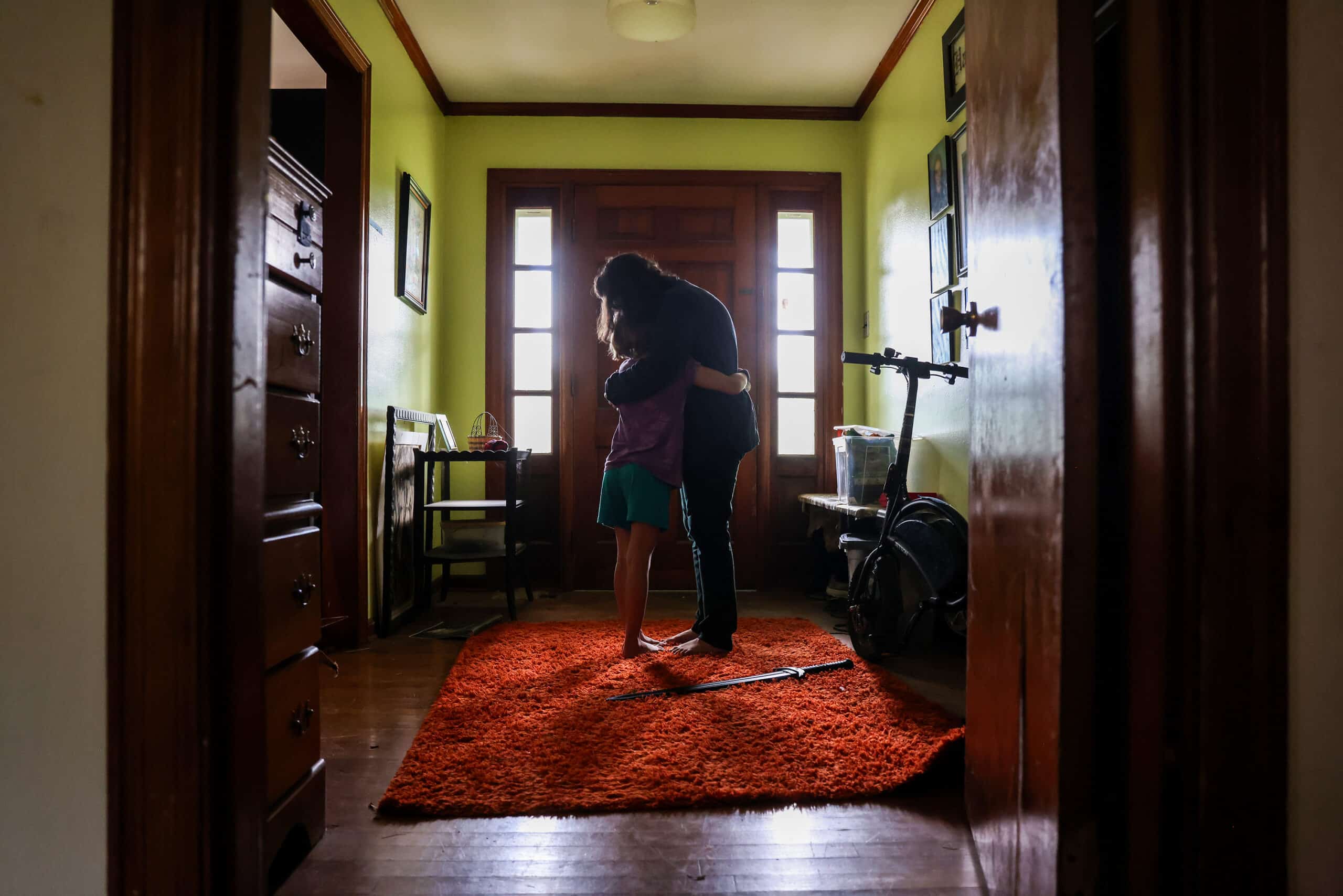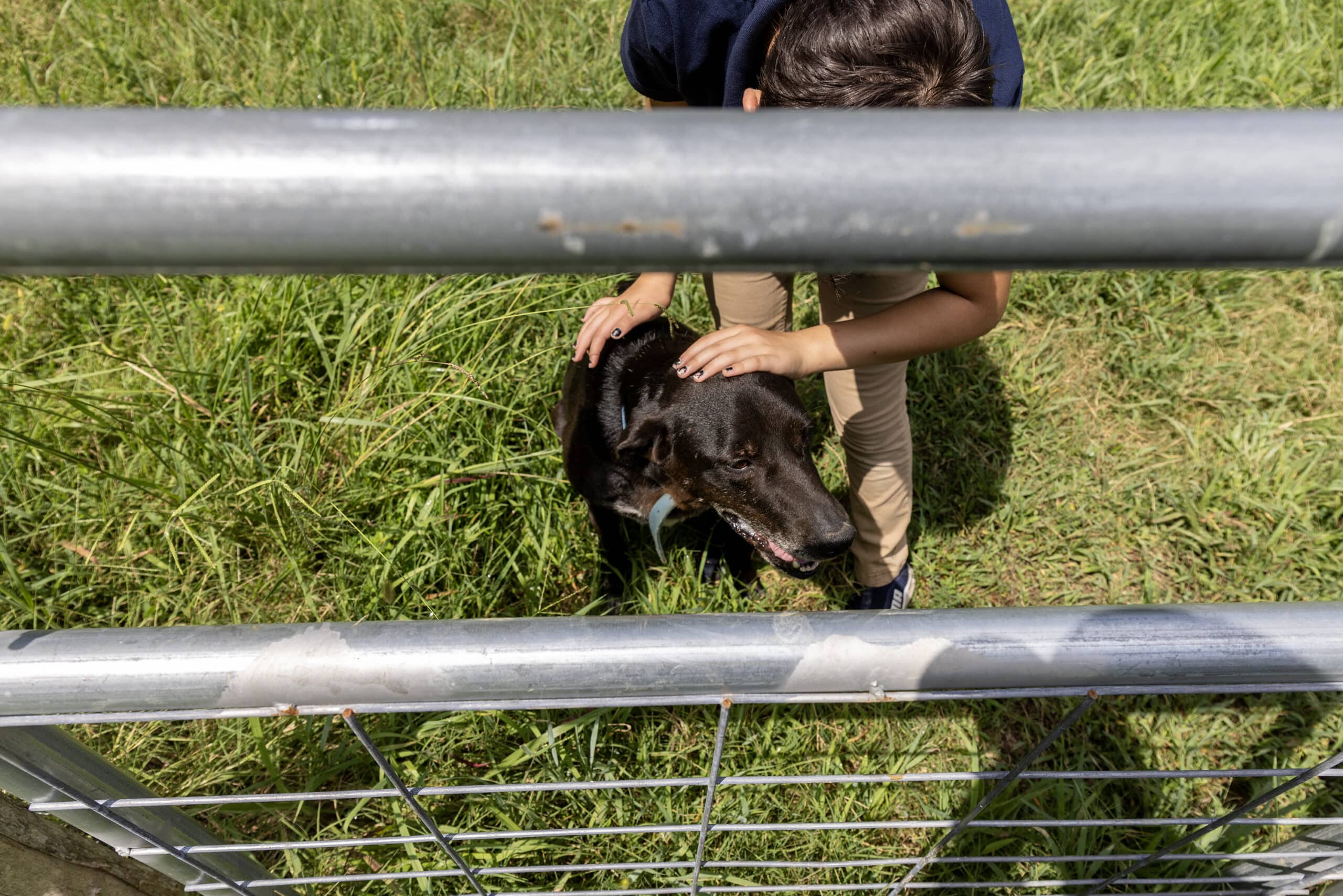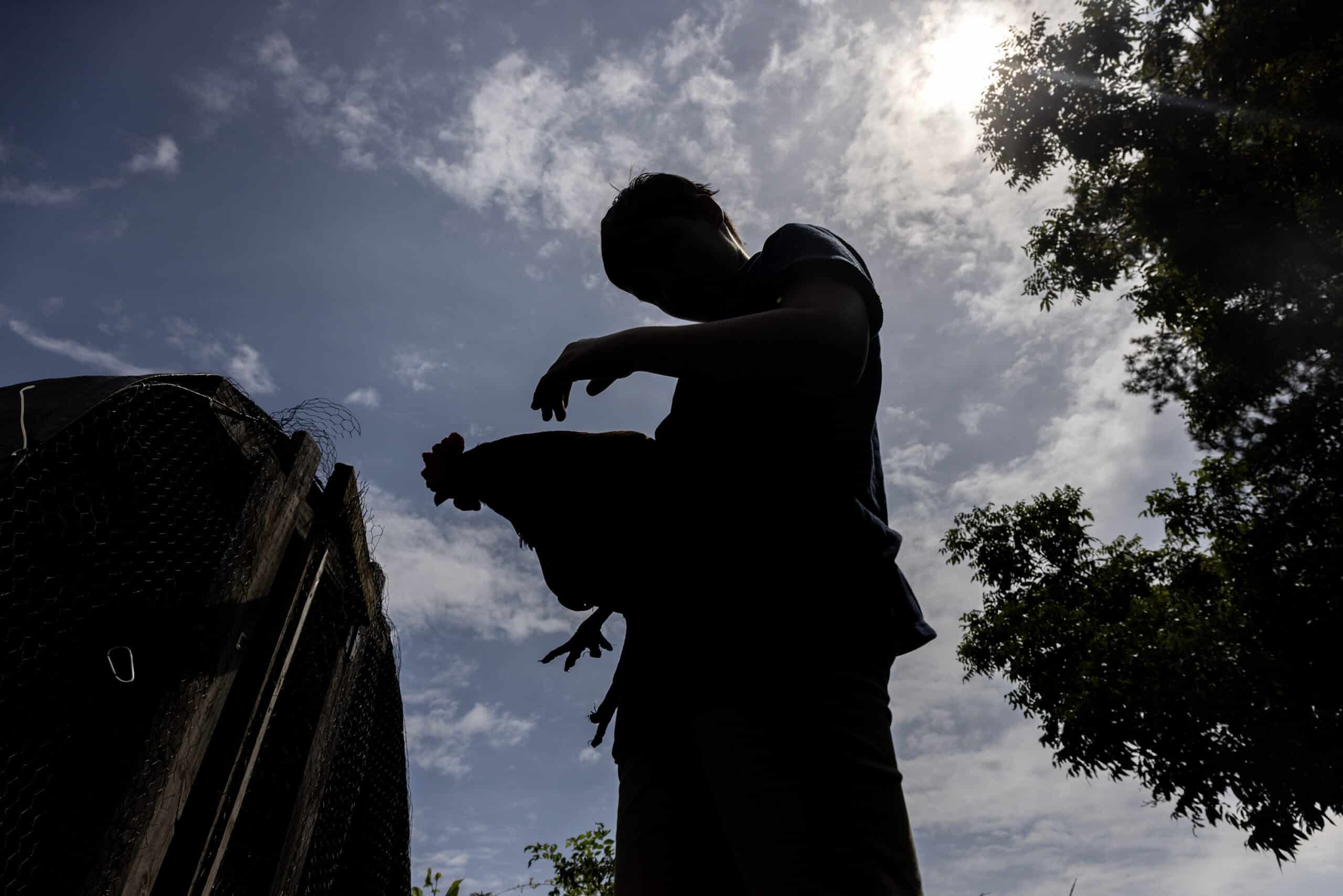Mississippi Today
In the Mississippi Bible Belt, a family wrestles with raising trans kids in the Mormon church

This article was copublished with The 19th, a nonprofit newsroom covering gender, politics, and policy. Sign up for The 19th’s newsletter here.
Marie and Brian Bauman held hands as they walked into the quiet worship hall of a north Mississippi church and situated themselves in the front row. Five of their seven kids settled on either side of them.
Most of the few dozen, mostly white, congregants of the Church of Jesus Christ of Latter Day Saints were dressed for a typical Sunday. The women wore dresses and skirts; the men, collared shirts and ties. But one member of the Baumans stood out: Jack, who wore pants, a tuxedo shirt dotted with silver lightning bolts and a lilac tie. Black nail polish was chipping off of his fingernails.
Ever since he could talk, Jack stated he was a boy. He invented new names for himself — first to use at home, then at school and church. Now 11 years old, Jack is one of a few thousand transgender or gender-nonconforming children in Mississippi growing up in a time when state lawmakers are increasingly hostile toward them.
That Sunday in February marked 40 days since House Republicans passed House Bill 1125 to ban transgender youth in Mississippi from receiving gender-affirming care, which lawmakers repeatedly likened to child abuse and a violation of God’s will, despite every major medical association supporting the treatment. Gov. Tate Reeves would soon make it law, a decision supported by many, but not all, in the Baumans’ largely conservative congregation.
The impending ban made the Baumans fearful for Jack’s health, safety and well-being. It also stirred up painful memories of the time in 2020 when their eldest daughter, Aria, came out as trans as a young adult, only to be told by church leaders that she’d be removed if she wore a dress to church again.
Ever since then, this family, whose names have been changed to protect them from retaliation, has grappled with a contradiction underscored by the surge of anti-trans bills in America: whether it’s possible to raise trans kids in a faith with a strict binary view of gender. Marie and Brian are choosing this path, but many religious families are not.
The family bowed their heads as an elderly member of the church, referred to as a brother, began speaking at the lectern. He is perceived by the family as one of the more accepting members of the congregation, sometimes sending the kids Cow Tales and other candy, but his speech quickly turned into a righteous counsel.
“We see evil crying and carnality covering the earth,” the brother said. “Liars, thieves, adulterers, homosexuals, murderers scarcely seek to hide their abominations from our view. Iniquity abounds, there is no peace on earth. We see evil forces everywhere uniting to destroy the family, to ridicule morality and decency.”
Jack yawned. Curled over a hymn book, he traced a tiny portrait of Jesus in black ink on a program.
“I want you to know that I love each and every one of you,” the brother said, wrapping up. “I’ve had my trials, we’ve all had trials, but together we can face them, we can deal with them and we can work through them.”
Marie hoped that could be the case for her family. She didn’t know at the time that Aria had all but left the church. Her second-oldest child, who like Aria and Jack is also gender-nonconforming, was inching away, too.
At that moment in the sanctuary, Marie hoped that by staying in the church, she might convince other Mormons to become more accepting.
“We’re taught that we’re in families to learn to be more Christ-like,” she said. “One of our core beliefs is that in the afterlife, we can’t take anything with us but we take our relationships. If my relationship with my kids is bad, how can I take anything with me?”

After worship, it was time for Sunday school. In the Baumans’ church, like other Mormon churches, most classes are sorted by gender.
The men gathered alone in the large hall. Kids rushed out into the hallway, heading to their lessons, and the women followed. But Marie did not go with them. She found it difficult to participate in theological discussions with other congregants after what happened with Aria. She was happiest teaching the kids music, but it wasn’t time for that yet, so she waited on a couch in the hallway. A framed portrait of Jesus Christ hung nearby.
As a Mormon trying to raise gender-nonconforming kids, Marie says she sees contradictions in the church’s teachings.
“There were so many places where the choices that were made were terrible — hey,” she said, interrupting herself as the branch president, one of the leaders who had told Aria she should not wear a dress to church again, stopped to say hello. She continued as he walked away: “I find it difficult that you can say we should love everyone and then get up and say just because you’re trans that makes you inherently evil.”
Still, she holds onto the belief that Mormonism, which prohibits women from serving in ecclesiastical roles, could become accepting of her children. But even she recognizes that she might be doing some mental gymnastics.
“We talk about personal revelation, and I could be wanting to believe things so badly that I really believe that,” she said.
“Personal revelation” is a kind of epiphany in Mormon doctrine. It’s divine intervention, a direct message from God. Like many Mormons, it has played a significant role in the life of Marie and her family. It motivated the family to move from Utah to Mississippi in 2017, joining roughly 22,000 other Mormons in the state, according to the church. A new congregation was starting in the state’s northern Hill County, and the Baumans’ wanted to be in a place they felt needed them.
Living in the Bible Belt was an adjustment for everyone, but especially for Aria. Though Mississippi and Utah have a nearly identical breakdown of registered Democrats to Republicans, the Baumans’ new town was tiny, with more Baptist churches than restaurants. It felt more conservative than the Utah college town Aria had left behind.
Growing up, Aria remembers feeling uneasy any time she heard about LGBTQ+ issues in the church, like when LDS leadership campaigned against marriage equality or instituted policies calling on Mormon children to renounce their gay parents. It wasn’t until Aria made queer friends in school, right before the family left Utah, that she understood why these issues bothered her — and started to consider coming out as trans.

But during that 2017 summer in rural Mississippi, more than 1,500 miles away from those friends, there was a discussion between congregants at her new church that triggered Aria. She recalled it was “about how awful everything was because the world was getting more progressive and queer people were becoming more acceptable.”
After the discussion, she ran out into the parking lot hyperventilating. She knew it would probably be safe to tell Marie, who had followed her, why she was so upset — Jack had already come out by then. But she couldn’t bring herself to.
“It was scary,” Aria said. “It affirmed coming out was not safe.”
The family’s move coincided with Donald Trump’s presidency and a nationwide rise in anti-trans bills and policies targeting bathrooms, sports teams, libraries and the classroom. Marie followed these bills closely and joined support groups for trans Mormons and their loved ones. She was looking for ways to advocate for Jack, motivated by family lore of relatives who were suffragettes.
“We are always dragging the church behind the culture,” she said.
By the time the legislative session started this past January, Marie was invested. She joined a Zoom call with other parents of trans kids in Mississippi and learned that lawmakers had already introduced at least 31 bills targeting the LGBTQ+ community. Many of these were inspired by model legislation from right-wing Christian groups like the Alliance Defending Freedom, which has argued that “when culture refuses to acknowledge the fundamental truth that we are created male and female in the image of God, everyone loses.”
Marie observed that outside of a handful of parents and activists, few in Mississippi were advocating for the trans community. At a protest in mid-February, a couple of progressive faith leaders spoke out against the bill.
But they weren’t represented by any lawmaker who has the power to pass legislation inside the Capitol. Republicans, who maintain a supermajority, fell in line to back HB 1125 when it was introduced. Gov. Reeves had signaled it was a priority during his yearly State of the State address. The Democrats’ then-presumptive nominee for governor, Brandon Presley, remained silent about the bill. And when Democratic lawmakers did ask questions about the bill, they repeatedly failed to call out the inaccurate information about gender-affirming care that Republicans gave in response.
“We’re talking about the total and complete removal of parts that God gave you and trying to reverse that,” one of the bill’s handlers, Sen. Joey Fillingane, said during a Senate committee hearing.
In the classroom that Sunday in February, as another mom helped Marie set up folding chairs in preparation for the music lesson, they talked about HB 1125 and how it could affect Jack.
Marie has been thinking about trans issues since Jack was a little kid. She decided years ago that she would be open about her family with anyone who asked, a philosophy that stemmed from a quote she’d read from a motivational speaker: “It’s hard to hate up close.” But she also understands that for many people, especially other members of her congregation, this is new. The common talking points from politicians about parents “coaching” their parents to be trans — comments that infuriate her — can stick with people.
HB 1125 wasn’t a problem for Jack yet, Marie explained to the other mom. Jack’s “social transition” was flexible, meaning that sometimes he went by he/him pronouns and wore masculine clothes, and sometimes he didn’t, a decision Marie let him lead. But if puberty started to harm Jack’s mental health, then the law would become a barrier to the care that Marie would seek.
“Jack currently is not on any hormone blockers, but it’s something we’ve talked about if her mental health is affected,” Marie said.
“I can understand how somebody who has no experience with it might say, ‘No, you shouldn’t let kids have these kinds of hormones,’” the mom replied. “I get that because, I mean, I’m a mom.”
“Right,” Marie said.
“But I’ve watched Jack grow up, so it’s not like I can sit here and say she’s coached into that. Like, I see this. So to deny care, like it’s detrimental for her,” the mom trailed off. “It’s complicated.”

Support like that from congregants was new to Marie. Officially, the LDS church’s stance on trans people is outlined in a document called “the General Handbook.” It advises against transitioning and states that trans Mormons who do would likely face “membership restrictions” that range from no longer being allowed to teach a class to being removed from the congregation entirely.
These guidelines can push queer people away from the church. There are many examples of LGBTQ+ Mormons who have been ostracized by their churches or disavowed by family members who’ve decided the religion is not compatible with acceptance. It’s a particular issue for the rising generation of Mormons: For the increasing number of millennials who’ve left, the church’s stance on LGBTQ+ issues was the third biggest reason.
Yet these rules aren’t fixed, and LDS leadership has changed its stance on social issues in the past, often through personal revelation. Notably, that’s how church leaders decided Black people could hold certain leadership positions in the 1970s. It wasn’t until the 1980s, amid a cultural recoil to the feminist movement and a rise in LGBTQ+ activism, that the church leadership started to insist gender was an immutable characteristic, said Taylor Petrey, a professor at Kalamazoo College who has studied the development of Mormon thought on gender and sexuality.
An important backdrop to the leadership’s positions on social issues, Petrey said, is a desire to dilute the religion’s stereotype, gained from the practice of polygamy, as sexually deviant.
The church often takes “a strong position in favor of a very rigid sexual morality because of that memory of what it meant to be on the outside of American sexual norms,” he said. “They cling very closely to heterosexuality, to patriarchy, to a kind of white, heteronormative family as the new image of sexuality that the church wants to promote.”
Strategy has also played a role in the changing norms. In 2008, the church famously backed California’s Proposition 8, a referendum that banned same-sex marriage. Leadership at the highest levels urged members to vote for it; according to some estimates, members spent more than $20 million in support.
The backlash was fierce. There were protests outside Mormon temples across the country; a popular gay rights blogger called for tourists to boycott skiing in Utah. The church backtracked and, a few years later, supported an anti-discrimination law in Utah, with some religious carve-outs, that protected LGBTQ+ people. Then last year, the church went further, backing a bill in Congress to protect same-sex marriage.
Petrey added that the General Handbook is not compulsory; congregations can deviate from it based on their members’ needs and expectations.
“Family unity, family, love, family harmony are such prioritized values that when the church or society is seen as causing a rift or is potentially a source of pain, many Latter Day Saints are like, ‘Well, I’ve been taught all my life that the family is the most important thing,’” Petrey said. “‘I’m going to choose my family.’”
That thinking is one reason why Aria stayed in the church despite feeling increasingly wary. Aria also knew that if she came out, she would risk severing her ties to her family, possibly forever. In Mormon doctrine, families stay together in the afterlife, as long as they’ve remained in the church in good standing.
By the time she was gearing up in 2020 for her mission, a rite-of-passage for Mormons that involves volunteer service or proselytizing, Aria knew she was trans. But she hadn’t come out yet, even as she was growing away from the church. A conversation with a family member who left the church inspired her to explore other forms of spirituality like paganism; its dramatic nature was attractive to her as a former theater kid. In Mississippi, she got close to a non-denominational pastor. She told him she was trans and, right after, he assaulted her.
“I kind of just went back deep in the closet,” she said.
Her mission loomed. It came with some added pressure: Aria and her parents thought she would be the first Mormon from north Mississippi to go on a mission since the late 1980s and possibly the first ever from the area to complete one. Her understanding was that a woman who went before her died before she could finish.
She had to prepare for it. Missionaries are expected to keep their hair cropped, but Aria’s hair was long and curly, so she burned locks of it in the woods. She tied herself blindfolded to a stake outside the family’s home, a ritual she said was meant to create a division in her life between her mission and “everything else.”
But the night before she was set to get on the plane to the Pacific Northwest, she broke down and told Marie that she was trans. Marie encouraged her to try to do the mission anyway.
“There is nothing you’ve said that makes you unworthy to serve,” Marie said she told Aria.
So Aria went. Away from home, her antidepressants stopped working. Her panic attacks became more frequent. Soon, it all became too much to wear the elder’s uniform of pants, a white button-up and a tie. She could no longer pretend like everything was OK. She made plans for suicide. But before that, Aria talked to a church therapist who helped her get a plane ticket home.
In the weeks that followed, Aria came out to her dad via letters, because that was easier than speaking the words. That October, she told her sister Sabrina, who is now 8 years old, when they were quarantined together after a COVID exposure in the bedroom they shared. She was touched when Sabrina suggested they both wear dresses to church that Sunday.
Sabrina wasn’t called to church that day — during the pandemic, congregants who were not needed stayed home — but Aria was asked to teach a primary class. So she donned a sage green wrap dress patterned with white flowers. She didn’t think it would be an issue because a few nights earlier, she’d worn a feminine vampire costume to a church Halloween party.
At service, only one person said something to her: A kid in her primary class asked why she was wearing a dress. She asked him why he wasn’t.
But a few days later, the branch president invited Aria to his house. Another leader was there. They told her she had been disruptive and warned that if she wore a dress again, she would be “exported out,” meaning removed from the church. She would be welcome back if she wore a pantsuit, the branch president said.
Aria left in tears.
The next week, church was awkward for Marie and Brian. Even though no one said anything to them about Aria, it felt like everyone knew what had happened.
“There was this weird thing, like almost a pity,” Marie said of the aftermath at church. “Like, ‘I’m sorry your child is doing this.’ And I just kept thinking, ‘I don’t feel bad about this. I feel bad that you feel bad about this.’”

On the way home in their golden minivan, the family went over what they had learned that day at church that day in February. The three teenagers had just watched a YouTube video, well-known to many Mormons, about a bespectacled housewife who judges her neighbor’s dirty clothesline. One day, she is astonished — her neighbor’s laundry is clean. Then her husband informs her that actually, she had been looking at the woman’s home through her own dirty kitchen windows. He had washed them.
The video ends with a lesson from the LDS president who notes, “thus the commandment, ‘judge not.’”
At home, Jack and Sabrina pulled on rain boots and ran around the family’s hilly property, the family’s older rescue dog bounding after them. They showed off the chicken coops, their goats with Russian names and a tree that Jack called “Whomping Willow,” but the priority was looking at the hogs. The babies had been castrated the day before, their tails still limp from the alcohol. The parents were plopped in the mud.
“You can tell which one is a girl, because the girl has,” Jack paused. “You’re going to have to explain this, Sabrina. I don’t want to say it out loud.”
“What?” Sabrina asked. “Both of them have nipples.”
“But hers are bigger,” Jack said.
Out of all seven children, Jack and Sabrina had spent the bulk of their childhood in Mississippi. At school, Jack was sometimes called by the name Marie and Brian gave him, sometimes by the one he chose; it depended on the teacher. The routine he has adopted — switching between pronouns — was growing uncomfortable, he said.
“I don’t know, I mean, I was born a girl but I want to be a boy,” Jack said.
“Jack is a girl at school and a boy at home,” Sabrina said.
“It’s weird,” Jack said. He announced the tour was over.

As Brian prepped chicken soup for dinner, Marie sat on the family’s velvet green couch and scrolled through her phone, searching for her favorite family photo. It shows the family standing hand-in-hand, eyes squinting in the bright sun, surrounded by dense, green vines. Aria is wearing the same dress she wore to church and fingerless, black-and-gray striped gloves.
Ever since the incident with church leaders, Marie said, Aria had been drifting away from the church. She tried attending service at a congregation in Tennessee, but the hour-long drive was tiring. The branch president came to the family’s house to try to apologize, but Aria had a panic attack. As he talked to Marie, Aria sat on the porch until she was finally calm enough to meet with him.
By fall 2021, she decided to move back to Utah to be closer to her queer friends and to try college again at a state university. In civics class one day, Aria listened to a conversation about how much money church leadership had poured into opposing same-sex marriage in California. It struck her that this wasn’t just the actions of people like her mom or other church congregants; who are, in Aria’s view, “apologetics” who don’t know better. The church’s support of Proposition 8 was an organized campaign to oppose her rights and the rights of people like her, Aria said. Still, it hurt to realize that her parents supported that campaign through tithings.
She had a revelation: “It finally hit me that it couldn’t be true, that it couldn’t be for me, that I was never going to fit within Christianity.”
“I came to the conclusion that either the church was wrong in every way, and I shouldn’t be associated with it, or the church was right and if that’s the case, then God hates me anyway so I might as well leave,” she said.
All this led Aria to tell Marie in mid-February that she was considering having her name purged from church records, a step that would completely sever her relationship with Mormonism. In March, she made it official.
Marie said she knew she could not dissuade Aria. She cites the varying viewpoints of congregants like the brother, or even the branch president. And she understands why Aria thinks it’s hypocritical of her to pay tithings to the church even as she disagrees with its stance on LGBTQ+ issues.
But, she said, she’s not responsible for how the church spends its money.
“I’m not going to be held responsible for that in the afterlife, whoever is mishandling it now — it is on them,” she said.
If Aria can’t be part of the church, Marie said she understands. Mormons are more conservative, and she said that often, the church’s culture is misunderstood as a substitute for doctrine.
“I may have issues with church policy but that doesn’t change my faith in the doctrine,” Marie said. “I don’t want to be doing mental gymnastics, and I hope that’s not what I’m doing. I do make a distinction between the church as an institution and the gospel of Jesus Christ.”
As for Jack, Marie said she and her husband haven’t told him about the bill yet, to avoid causing undue anxiety or make him feel like a path forward is foreclosed as long as they live in Mississippi.
As Marie talked, Jack and his siblings passed around a piece of paper, playing a game in which each person contributes a sentence to a short story. Jack handed the final result — a story about an animal that is ostracized by its family but ultimately finds a way to survive. Was it about them?
Jack grinned. “Maybe.”
This article first appeared on Mississippi Today and is republished here under a Creative Commons license.
Mississippi Today
Mississippi River flooding Vicksburg, expected to crest on Monday
Warren County Emergency Management Director John Elfer said Friday floodwaters from the Mississippi River, which have reached homes in and around Vicksburg, will likely persist until early May. Elfer estimated there areabout 15 to 20 roads underwater in the area.
“We’re about half a foot (on the river gauge) from a major flood,” he said. “But we don’t think it’s going to be like in 2011, so we can kind of manage this.”
The National Weather projects the river to crest at 49.5 feet on Monday, making it the highest peak at the Vicksburg gauge since 2020. Elfer said some residents in north Vicksburg — including at the Ford Subdivision as well as near Chickasaw Road and Hutson Street — are having to take boats to get home, adding that those who live on the unprotected side of the levee are generally prepared for flooding.



“There are a few (inundated homes), but we’ve mitigated a lot of them,” he said. “Some of the structures have been torn down or raised. There are a few people that still live on the wet side of the levee, but they kind of know what to expect. So we’re not too concerned with that.”
The river first reached flood stage in the city — 43 feet — on April 14. State officials closed Highway 465, which connects the Eagle Lake community just north of Vicksburg to Highway 61, last Friday.

Elfer said the areas impacted are mostly residential and he didn’t believe any businesses have been affected, emphasizing that downtown Vicksburg is still safe for visitors. He said Warren County has worked with the U.S. Army Corps of Engineers and the Mississippi Emergency Management Agency to secure pumps and barriers.
“Everybody thus far has been very cooperative,” he said. “We continue to tell people stay out of the flood areas, don’t drive around barricades and don’t drive around road close signs. Not only is it illegal, it’s dangerous.”
NWS projects the river to stay at flood stage in Vicksburg until May 6. The river reached its record crest of 57.1 feet in 2011.




This article first appeared on Mississippi Today and is republished here under a Creative Commons Attribution-NoDerivatives 4.0 International License.![]()
Mississippi Today
With domestic violence law, victims ‘will be a number with a purpose,’ mother says
Joslin Napier. Carlos Collins. Bailey Mae Reed.
They are among Mississippi domestic violence homicide victims whose family members carried their photos as the governor signed a bill that will establish a board to study such deaths and how to prevent them.
Tara Gandy, who lost her daughter Napier in Waynesboro in 2022, said it’s a moment she plans to tell her 5-year-old grandson about when he is old enough. Napier’s presence, in spirit, at the bill signing can be another way for her grandson to feel proud of his mother.
“(The board) will allow for my daughter and those who have already lost their lives to domestic violence … to no longer be just a number,” Gandy said. “They will be a number with a purpose.”
Family members at the April 15 private bill signing included Ashla Hudson, whose son Collins, died last year in Jackson. Grandparents Mary and Charles Reed and brother Colby Kernell attended the event in honor of Bailey Mae Reed, who died in Oxford in 2023.
Joining them were staff and board members from the Mississippi Coalition Against Domestic Violence, the statewide group that supports shelters and advocated for the passage of Senate Bill 2886 to form a Domestic Violence Facility Review Board.
The law will go into effect July 1, and the coalition hopes to partner with elected officials who will make recommendations for members to serve on the board. The coalition wants to see appointees who have frontline experience with domestic violence survivors, said Luis Montgomery, public policy specialist for the coalition.
A spokesperson from Gov. Tate Reeves’ office did not respond to a request for comment Friday.
Establishment of the board would make Mississippi the 45th state to review domestic violence fatalities.
Montgomery has worked on passing a review board bill since December 2023. After an unsuccessful effort in 2024, the coalition worked to build support and educate people about the need for such a board.
In the recent legislative session, there were House and Senate versions of the bill that unanimously passed their respective chambers. Authors of the bills are from both political parties.
The review board is tasked with reviewing a variety of documents to learn about the lead up and circumstances in which people died in domestic violence-related fatalities, near fatalities and suicides – records that can include police records, court documents, medical records and more.
From each review, trends will emerge and that information can be used for the board to make recommendations to lawmakers about how to prevent domestic violence deaths.
“This is coming at a really great time because we can really get proactive,” Montgomery said.
Without a board and data collection, advocates say it is difficult to know how many people have died or been injured in domestic-violence related incidents.
A Mississippi Today analysis found at least 300 people, including victims, abusers and collateral victims, died from domestic violence between 2020 and 2024. That analysis came from reviewing local news stories, the Gun Violence Archive, the National Gun Violence Memorial, law enforcement reports and court documents.
Some recent cases the board could review are the deaths of Collins, Napier and Reed.
In court records, prosecutors wrote that Napier, 24, faced increased violence after ending a relationship with Chance Fabian Jones. She took action, including purchasing a firearm and filing for a protective order against Jones.
Jones’s trial is set for May 12 in Wayne County. His indictment for capital murder came on the first anniversary of her death, according to court records.
Collins, 25, worked as a nurse and was from Yazoo City. His ex-boyfriend Marcus Johnson has been indicted for capital murder and shooting into Collins’ apartment. Family members say Collins had filed several restraining orders against Johnson.
Johnson was denied bond and remains in jail. His trial is scheduled for July 28 in Hinds County.
He was a Jackson police officer for eight months in 2013. Johnson was separated from the department pending disciplinary action leading up to immediate termination, but he resigned before he was fired, Jackson police confirmed to local media.
Reed, 21, was born and raised in Michigan and moved to Water Valley to live with her grandparents and help care for her cousin, according to her obituary.
Kylan Jacques Phillips was charged with first degree murder for beating Reed, according to court records. In February, the court ordered him to undergo a mental evaluation to determine if he is competent to stand trial, according to court documents.
At the bill signing, Gandy said it was bittersweet and an honor to meet the families of other domestic violence homicide victims.
“We were there knowing we are not alone, we can travel this road together and hopefully find ways to prevent and bring more awareness about domestic violence,” she said.
This article first appeared on Mississippi Today and is republished here under a Creative Commons Attribution-NoDerivatives 4.0 International License.
Mississippi Today
Court to rule on DeSoto County Senate districts with special elections looming
A federal three-judge panel will rule in coming days on how political power in northwest Mississippi will be allocated in the state Senate and whether any incumbents in the DeSoto County area might have to campaign against each other in November special elections.
The panel, comprised of all George W. Bush-appointed judges, ordered state officials last week to, again, craft a new Senate map for the area in the suburbs of Memphis. The panel has held that none of the state’s prior maps gave Black voters a realistic chance to elect candidates of their choice.
The latest map proposed by the all-Republican State Board of Election Commissioners tweaked only four Senate districts in northwest Mississippi and does not pit any incumbent senators against each other.
The state’s proposal would keep the Senate districts currently held by Sen. Michael McLendon, a Republican from Hernando and Sen. Kevin Blackwell, a Republican from Southaven, in majority-white districts.
But it makes Sen. David Parker’s district a slightly majority-Black district. Parker, a white Republican from Olive Branch, would run in a district with a 50.1% black voting-age population, according to court documents.
The proposal also maintains the district held by Sen. Reginald Jackson, a Democrat from Marks, as a majority-Black district, although it reduces the Black voting age population from 61% to 53%.
Gov. Tate Reeves, Secretary of State Michael Watson, and Attorney General Lynn Fitch comprise the State Board of Election Commissioners. Reeves and Watson voted to approve the plan. But Watson, according to meeting documents, expressed a wish that the state had more time to consider different proposals.
Fitch did not attend the meeting, but Deputy Attorney General Whitney Lipscomb attended in her place. Lipscomb voted against the map, although it is unclear why. Fitch’s office declined to comment on why she voted against the map because it involves pending litigation.
The reason for redrawing the districts is that the state chapter of the NAACP and Black voters in the state sued Mississippi officials for drawing legislative districts in a way that dilutes Black voting power.
The plaintiffs, represented by the ACLU, are likely to object to the state’s newest proposal, and they have until April 29 to file an objection with the court
The plaintiffs have put forward two alternative proposals for the area in the event the judges rule against the state’s plans.
The first option would place McLendon and Blackwell in the same district, and the other would place McLendon and Jackson in the same district.
It is unclear when the panel of judges will issue a ruling on the state’s plan, but they will not issue a ruling until the plaintiffs file their remaining court documents next week.
While the November election is roughly six months away, changing legislative districts across counties and precincts is technical work, and local election officials need time to prepare for the races.
The judges have not yet ruled on the full elections calendar, but U.S. Fifth Circuit Court of Appeals Judge Leslie Southwick said at a hearing earlier this month that the panel was committed have the elections in November.
This article first appeared on Mississippi Today and is republished here under a Creative Commons Attribution-NoDerivatives 4.0 International License.
-

 News from the South - Florida News Feed6 days ago
News from the South - Florida News Feed6 days agoJim talks with Rep. Robert Andrade about his investigation into the Hope Florida Foundation
-

 News from the South - Virginia News Feed7 days ago
News from the South - Virginia News Feed7 days agoHighs in the upper 80s Saturday, backdoor cold front will cool us down a bit on Easter Sunday
-

 News from the South - Arkansas News Feed7 days ago
News from the South - Arkansas News Feed7 days agoValerie Storm Tracker
-

 News from the South - Kentucky News Feed7 days ago
News from the South - Kentucky News Feed7 days agoU.S. Supreme Court pauses deportations under wartime law
-

 Mississippi Today5 days ago
Mississippi Today5 days ago‘Trainwreck on the horizon’: The costly pains of Mississippi’s small water and sewer systems
-

 News from the South - Alabama News Feed4 days ago
News from the South - Alabama News Feed4 days agoPrayer Vigil Held for Ronald Dumas Jr., Family Continues to Pray for His Return | April 21, 2025 | N
-

 News from the South - Texas News Feed5 days ago
News from the South - Texas News Feed5 days agoMeteorologist Chita Craft is tracking a Severe Thunderstorm Warning that's in effect now
-

 Mississippi Today7 days ago
Mississippi Today7 days agoOn this day in 1977, Alex Haley awarded Pulitzer for ‘Roots’














































